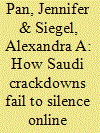|
|
|
Sort Order |
|
|
|
Items / Page
|
|
|
|
|
|
|
| Srl | Item |
| 1 |
ID:
160559


|
|
|
|
|
| Summary/Abstract |
A prerequisite for the durability of authoritarian regimes as well as their effective governance is the regime’s ability to gather reliable information about the actions of lower-tier officials. Allowing public participation in the form of online complaints is one approach authoritarian regimes have taken to improve monitoring of lower-tier officials. In this paper, we gain rare access to internal communications between a monitoring agency and upper-level officials in China. We show that citizen grievances posted publicly online that contain complaints of corruption are systematically concealed from upper-level authorities when they implicate lower-tier officials or associates connected to lower-tier officials through patronage ties. Information manipulation occurs primarily through omission of wrongdoing rather than censorship or falsification, suggesting that even in the digital age, in a highly determined and capable regime where reports of corruption are actively and publicly voiced, monitoring the behavior of regime agents remains a challenge.
|
|
|
|
|
|
|
|
|
|
|
|
|
|
|
|
| 2 |
ID:
121124


|
|
|
|
|
| Publication |
2013.
|
| Summary/Abstract |
We offer the first large scale, multiple source analysis of the outcome of what may be the most extensive effort to selectively censor human expression ever implemented. To do this, we have devised a system to locate, download, and analyze the content of millions of social media posts originating from nearly 1,400 different social media services all over China before the Chinese government is able to find, evaluate, and censor (i.e., remove from the Internet) the subset they deem objectionable. Using modern computer-assisted text analytic methods that we adapt to and validate in the Chinese language, we compare the substantive content of posts censored to those not censored over time in each of 85 topic areas. Contrary to previous understandings, posts with negative, even vitriolic, criticism of the state, its leaders, and its policies are not more likely to be censored. Instead, we show that the censorship program is aimed at curtailing collective action by silencing comments that represent, reinforce, or spur social mobilization, regardless of content. Censorship is oriented toward attempting to forestall collective activities that are occurring now or may occur in the future-and, as such, seem to clearly expose government intent.
|
|
|
|
|
|
|
|
|
|
|
|
|
|
|
|
| 3 |
ID:
171338


|
|
|
|
|
| Summary/Abstract |
Saudi Arabia has imprisoned and tortured activists, religious leaders, and journalists for voicing dissent online. This reflects a growing worldwide trend in the use of physical repression to censor online speech. In this paper, we systematically examine the consequences of imprisoning well-known Saudis for online dissent by analyzing over 300 million tweets as well as detailed Google search data from 2010 to 2017 using automated text analysis and crowd-sourced human evaluation of content. We find that repression deterred imprisoned Saudis from continuing to dissent online. However, it did not suppress dissent overall. Twitter followers of the imprisoned Saudis engaged in more online dissent, including criticizing the ruling family and calling for regime change. Repression drew public attention to arrested Saudis and their causes, and other prominent figures in Saudi Arabia were not deterred by the repression of their peers and continued to dissent online.
|
|
|
|
|
|
|
|
|
|
|
|
|
|
|
|
|
|
|
|
|